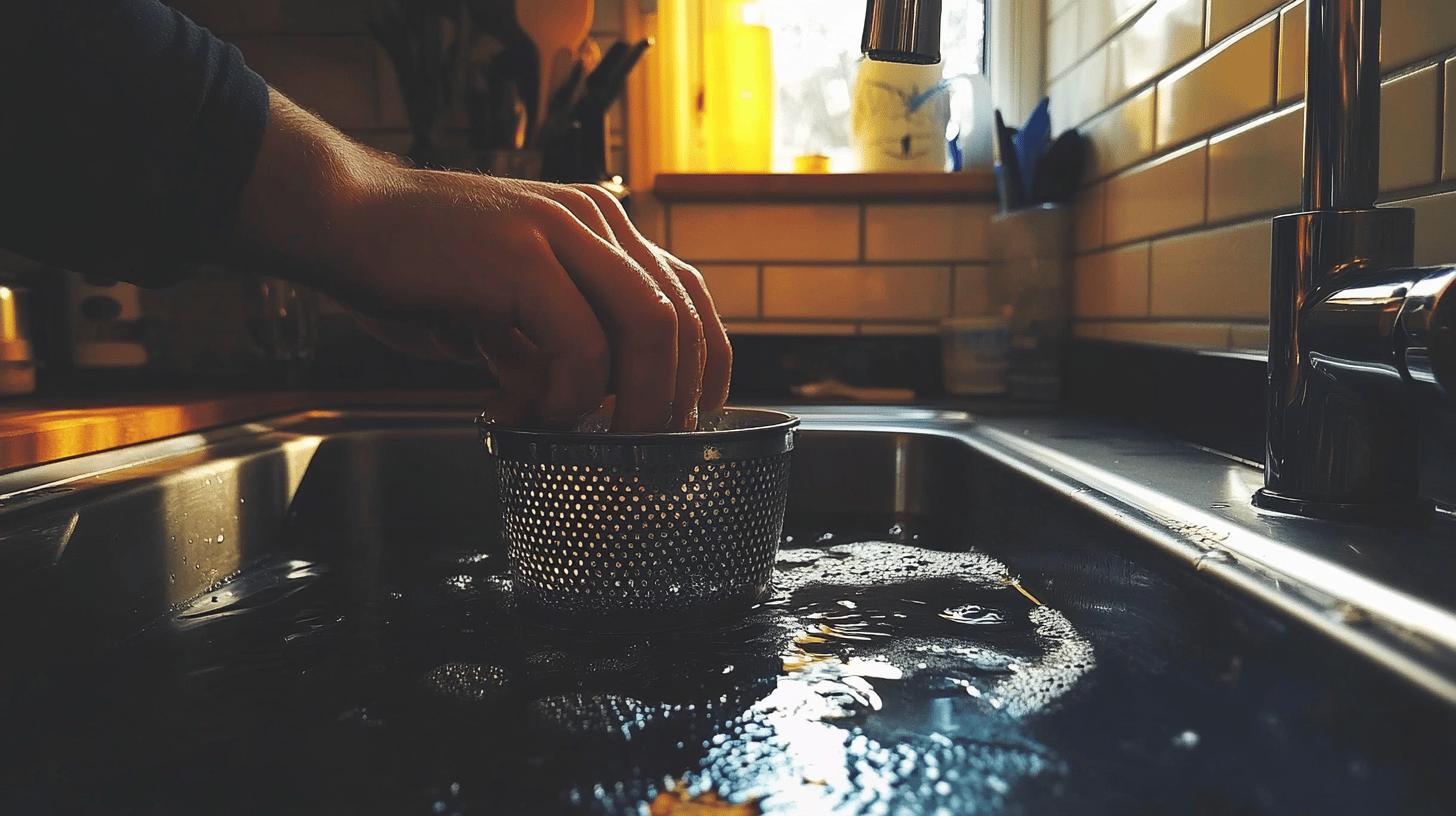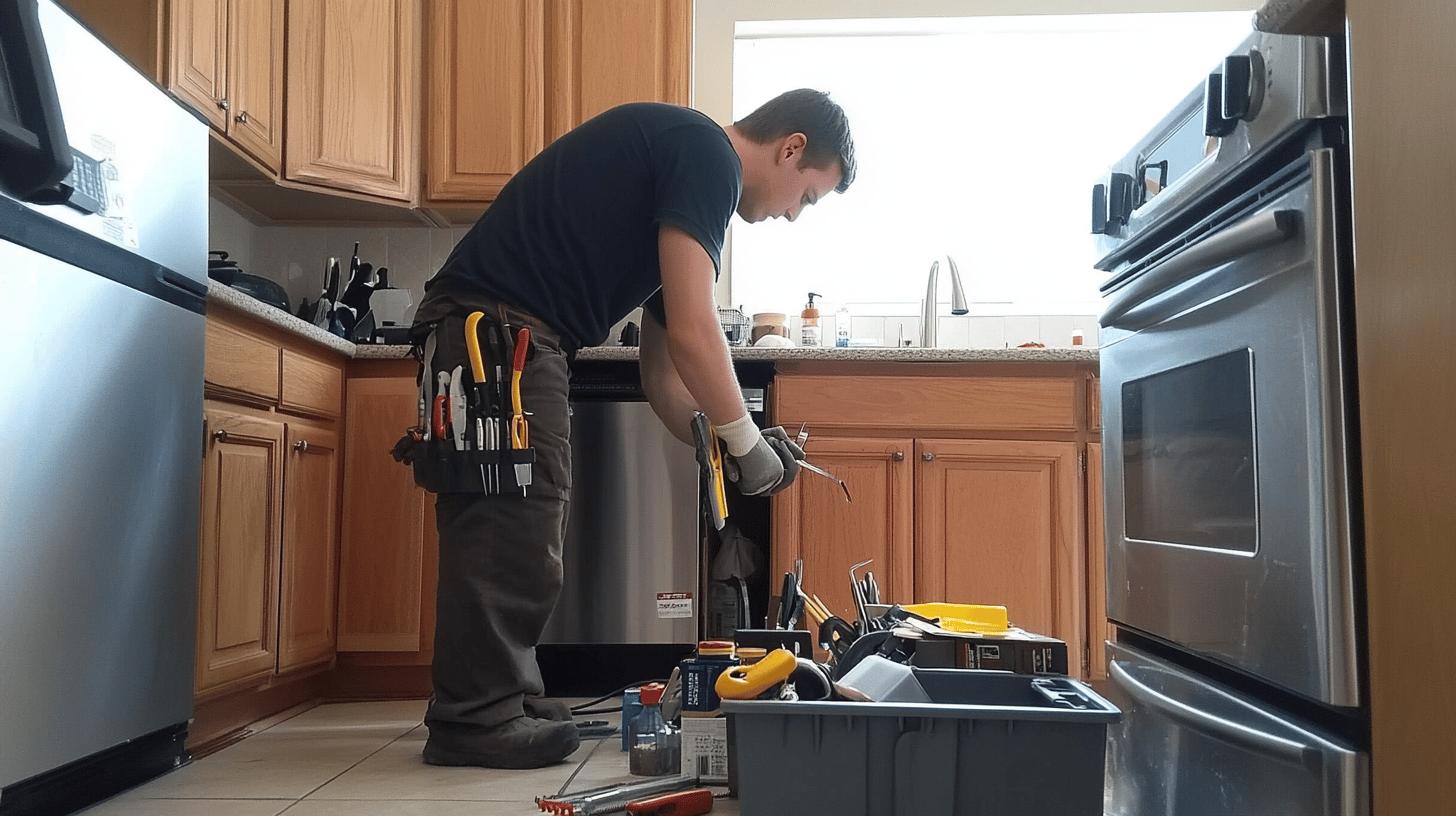TL;DR:
- Plumbing maintenance is crucial for home value (15%) and functionality.
- Prevents costly repairs, ensures clean water flow, and supports sustainability.
- Daily tips: avoid grease in sinks, use strainers, check for leaks, run water in unused sinks, inspect pipes, clean showerheads.
- Weekly tips: check water pressure, inspect under sinks, test faucets, ensure proper toilet flushing.
- Winter: insulate pipes, disconnect garden hoses, install faucet covers.
- Spring: inspect for freeze damage, clean gutters, test sump pumps.
- Summer: check sprinkler systems, inspect outdoor spigots, maintain water heater efficiency.
- Call professionals for severe issues (e.g., low pressure, leaks, unusual noises).
- Create a structured maintenance plan including seasonal tasks and regular inspections.
Are you unknowingly draining your finances with plumbing neglect? Regular maintenance not only boosts your home’s efficiency but also protects its value—did you know that 15% of your home’s worth depends on the condition of your plumbing? Picture the peace of mind that comes with consistent water flow and efficient waste management, all while avoiding costly emergencies. In this guide, we’ll walk through practical tips that not only improve your home’s efficiency but also safeguard its long-term value. Embrace these simple strategies to ensure your plumbing system works seamlessly for you. Let’s dive into the essential actions that keep everything running smoothly.
Understanding the Importance of Plumbing Maintenance
Regular plumbing maintenance is essential to protect your home’s value and keep things running smoothly. Plumbing accounts for about 15% of your home’s worth, so maintaining it ensures you have consistent water flow and proper waste disposal. Taking care of your system helps prevent expensive repairs and strengthens your home’s infrastructure. By investing time in routine checks and maintenance, you can avoid unexpected breakdowns and extend the lifespan of your plumbing system.
- Prevents costly repairs
- Ensures clean water flow
- Proper waste disposal
- Increases home value
- Supports environmental sustainability
Regular plumbing maintenance not only saves you money but also helps the environment. By addressing minor issues early, you avoid costly major repairs or replacements down the line. A well-maintained plumbing system reduces water waste and lowers energy consumption for heating, making it a win for both your wallet and the planet. It’s a smart financial move and an eco-friendly choice that supports responsible resource management.
Daily and Weekly Plumbing Maintenance Tips

Daily care keeps plumbing systems efficient. What daily actions help prevent clogs? Avoid pouring grease or oils down the kitchen sink, as they can block pipes. Use a drain strainer to catch food particles, which are common clog culprits. Check for leaks around sinks and toilets regularly to catch small issues early. Run water in unused sinks to stop odors from forming and inspect visible pipes for drips signaling a problem. Clean your showerhead to ensure optimal water flow.
- Avoid putting grease or oils down the kitchen sink
- Use a drain strainer to catch food particles
- Check for leaks around sinks and toilets
- Run water in unused sinks to prevent odors
- Inspect visible pipes for drips
- Maintain a clean showerhead
Weekly maintenance is equally important. What should you do weekly to prevent issues? Check your water pressure to ensure it’s neither too high nor too low. Incorrect pressure strains the system. Inspect under sinks for hidden leaks. Test all faucets for drips and address them promptly. Ensure toilets flush correctly to avoid blockages and water waste.
- Check water pressure
- Inspect underneath sinks for leaks
- Test all faucets for drips
- Ensure toilets flush properly
Consistency in these tasks maintains your plumbing health. Including these checks in your routine prevents minor issues from escalating into costly repairs. Regular attention boosts home efficiency and extends the lifespan of fixtures and pipes, saving time and money long-term.
Seasonal Plumbing Maintenance Tips
Winter Plumbing Care
What steps keep plumbing safe during winter? Insulate exposed pipes to prevent freezing and bursting, which causes expensive damage. Disconnect garden hoses to stop water from freezing and causing spigot damage. Install faucet covers on outdoor spigots for extra freeze protection.
- Insulate exposed pipes
- Disconnect garden hoses
- Install faucet covers
Spring Plumbing Preparation
How do you ready plumbing for spring? Inspect pipes for winter freeze damage. Check for cracks or leaks needing immediate repair. Clean gutters and downspouts to ensure proper drainage and prevent foundation water pooling. Test sump pumps to confirm they work properly, as spring brings more rain.
- Inspect pipes for freeze damage
- Clean gutters and downspouts
- Test sump pumps
Summer Plumbing Checklist
What ensures plumbing efficiency in summer? Check sprinkler systems for efficient operation without water waste. Inspect outdoor spigots for leaks to avoid high water bills and damage. Maintain water heater efficiency to ensure constant hot water and reduce energy use.
- Check sprinkler systems
- Inspect outdoor spigots for leaks
- Maintain water heater efficiency
When to Call a Professional Plumber

Some plumbing issues might seem DIY-friendly, but it’s key to know your limits. What should you avoid in DIY plumbing? Simple tasks, like fixing a loose faucet or clearing a minor drain, are manageable for many. However, complex issues need a professional’s expertise and tools. Attempting major fixes without knowledge can worsen damage, increase costs, and pose safety risks.
- Persistent low water pressure
- Unusual noises in pipes
- Frequent clogs or backups
- Water heater issues
- Major leaks or flooding
Why hire a licensed plumber for complicated repairs? Professionals bring expertise to ensure repairs are correct and efficient. They identify root causes, reducing repeat problems. Equipped with the right tools, they safely tackle complex repairs. Hiring a professional saves time, prevents further damage, and protects your plumbing for the long term.
Creating a Plumbing Maintenance Plan
How crucial is a structured plumbing maintenance plan? Precise planning prevents costly repairs and extends system life. Adopting a plan allows for routine checks and proactive measures, maintaining infrastructure health. It spots issues early, keeping everything running efficiently and saving unexpected expenses.
Why include professional inspections? Professional annual inspections spot hidden issues, enhancing routine task effectiveness like leak checks or pressure tests. Combining professional and routine efforts creates a preventive strategy minimizing failures and extending system lifespan.
How can seasonal tasks fit into your plan? Seasonal changes affect plumbing, making weather-appropriate tasks essential. In winter, insulate pipes and check freeze damage. In spring, ensure gutters and sump pumps are functional. In summer, focus on water conservation and outdoor maintenance. Seasonal attention protects your home and boosts efficiency year-round.
|Task|Frequency|
|—|—|
|Check for leaks|Monthly|
|Flush water heater|Bi-annual|
|Inspect pipes|Annually|
|Clean drains|Monthly|
|Test water pressure|Quarterly|
|Professional inspection|Annually|
Final Words
Regular plumbing maintenance is essential for maintaining your home’s value and ensuring a reliable water system. By staying on top of daily and weekly tasks, like checking for leaks and using drain strainers, you can prevent small issues from escalating into costly repairs. Seasonal tasks, such as insulating pipes in winter and cleaning gutters in spring, also protect your plumbing system from temperature-related damage.
Knowing when to call a professional plumber is equally important. Some problems require expert attention, and timely intervention can save you from bigger headaches down the road. Establishing a maintenance plan that includes scheduled inspections helps catch hidden issues early and ensures the long-term health of your plumbing system.
By embracing these maintenance practices, you’ll not only support your home’s efficiency but also enhance its comfort and value. Keeping your plumbing system in top shape prevents disruptions, reduces unexpected expenses, and supports sustainable resource management.
FAQ
How to maintain your plumbing system?
To maintain your plumbing system, regular tasks include checking for leaks, using drain strainers, and ensuring clean water flow. Seasonal adjustments, like insulating pipes in winter, also help prevent costly issues.
What does plumbing maintenance include?
Plumbing maintenance includes leak inspections, cleaning drains, maintaining water pressure, and checking the condition of water heaters and fixtures. Routine checks help avoid major repairs and extend system life.
What are the common mistakes in plumbing?
Common plumbing mistakes involve neglecting regular inspections, ignoring minor leaks, disposing of inappropriate materials down the drain, and handling complex repairs without professional assistance.
How can I improve my plumbing work?
You can improve your plumbing work by performing routine maintenance like checking for leaks, using strainers to prevent clogs, and adjusting seasonal care to protect against weather-related issues.

